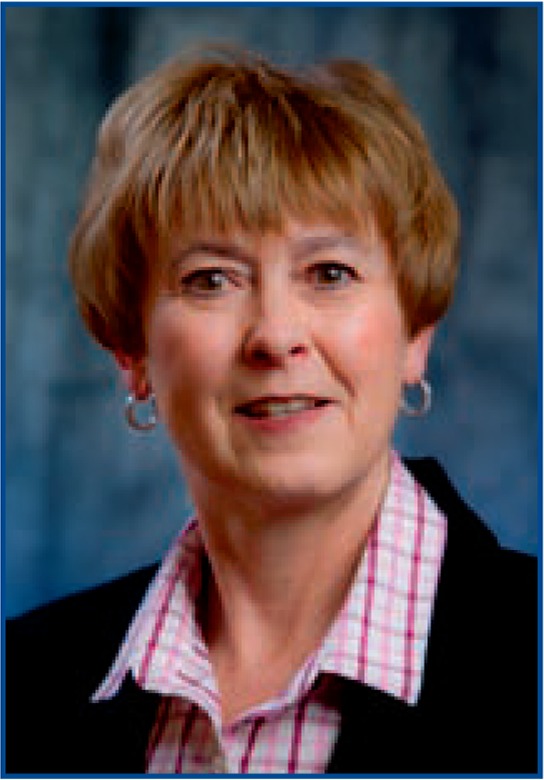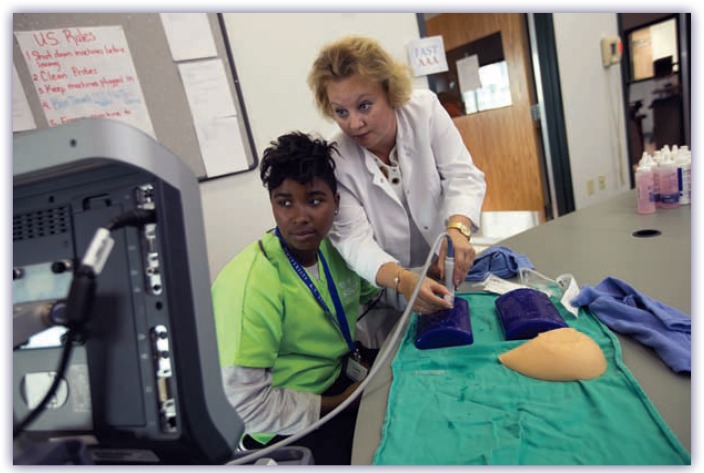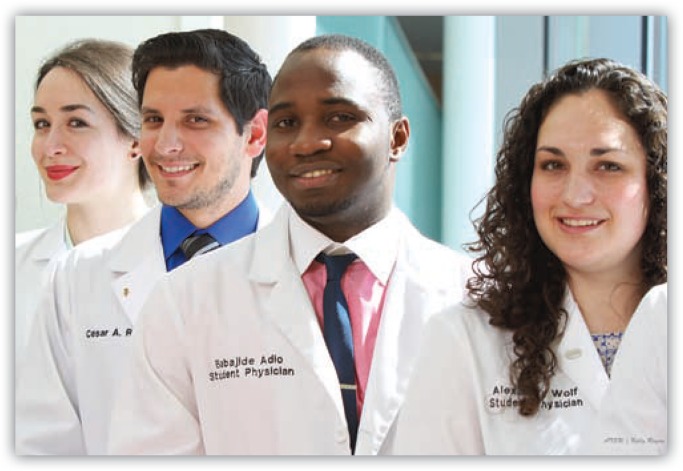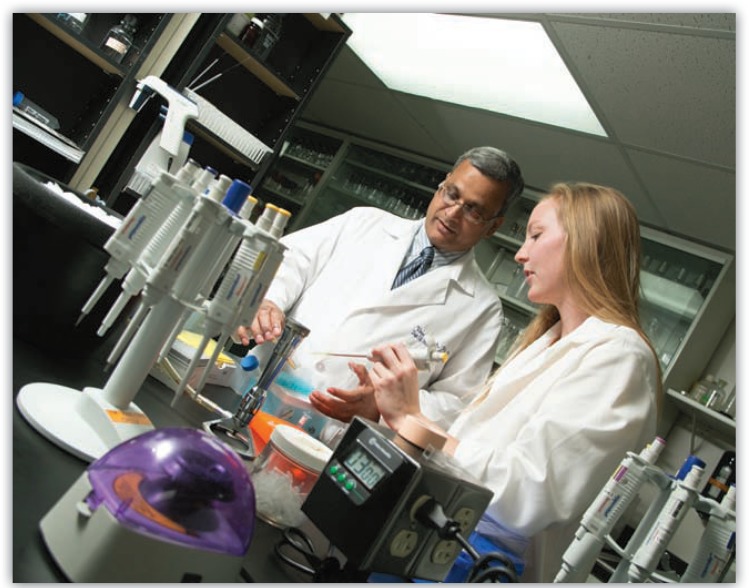2017 will mark the 125th anniversary of the founding college of osteopathic medicine, A.T. Still University—Kirksville College of Osteopathic Medicine (ATSU-KCOM). The profession has grown and changed in many ways since its beginning but the institution continues to carry out the mission of preparing highly competent professionals with a commitment to its osteopathic heritage and focus on whole-person health care. ATSU-KCOM works hard to provide the best medical education and training for its students through an innovative curriculum, in a research environment.
A.T. Still, DO, the founder of the profession and ATSU-KCOM envisioned an approach to patient care based on the tenets a body is a unit made up of the body, mind and spirit. This set the tone for the whole person approach to patient care. Another tenet of the profession states the body is capable of self-regulation, self-healing, and health maintenance. This lends to the strong focus on wellness and prevention incorporated into osteopathic care.
Today, osteopathic medical students represent about 25 percent of all medical students in the United States. There are more than 30 osteopathic medical colleges and more than 100,000 osteopathic physicians practicing in the country. The osteopathic profession has continued training students to be successful in any specialty of choice but has remained ahead at producing primary care physicians, graduating more than 50 percent of their students in this field. ATSU-KCOM’s program blends a rigorous academic curriculum, state-of-the-art technology and hands-on clinical training to best prepare graduates for residency.
Curriculum
ATSU-KCOM has a patient-centered systems curriculum, which integrates learning of both explanatory sciences and clinical medicine. This year, ATSU-KCOM won an American Association of Colleges of Osteopathic Medicine (AACOM) Innovation Award at the annual conference for “Patient Morning Rounds,” which is a collaborative faculty effort bringing a real-life patient into the classroom to present their case. This was recognized as a novel way to guide clinical problem-solving while modeling physician-patient interactions in the large-group setting.
In an effort to prepare osteopathic students entering into assessment innovations in graduate medical education AACOM recently created a national steering committee to guide integration of osteopathic principles and practices into the Core Entrustable Professional Activities for Entering Residency (CEPAER). ATSU-KCOM faculty members serve on the committee to help prepare the profession for this enhancement and to better prepare our students. The steering committee will advance implementation of EPAs within undergraduate medical education to prepare osteopathic graduates to meet performance outcomes and ensure competitiveness in residency applications.
In addition to the core curriculum, the ATSU-KCOM Center for Medical Humanities offers many electives allowing students to broaden and enrich their learning experience. These include electives on spirituality in health care, literature in medicine, vulnerable populations, advanced wilderness life support, culinary medicine and medical Spanish to name a few.
Technology
At ATSU-KCOM clinical ultrasound has continued to be an integral part of curricular innovation in training future physicians. Students learn living anatomy and physiology along with point-of-care bedside examinations, such as the FAST exam, which prepares them for emergent clinical encounters. Clinical cases are used to develop clinical reasoning helping to bridge the gap among basic science, diagnosis, and clinical applications. All first- and second-year students use ultrasound for learning anatomy and physiology, then an advanced ultrasound course is available for third- and fourth- year students on clinical rotations.
Tatyana Kondrashova, MD, PhD, ATSU-KCOM associate professor, family medicine, demonstrates ultrasound techniques to a high school student attending an ATSU-sponsored Summer Healthcare Career Experience for students interested in healthcare as a profession.
Ultrasound training at the College has expanded beyond use in required curriculum. Many student organizations engage in applied ultrasound learning, including radiology, challenge students to work together as a team, apply clinical anesthesia, emergency medicine, and sports medicine. Activities can include development of guided knee injection skills or echocardiography. In addition to ultrasound integration at the medical school, ATSU-KCOM faculty train all dental students at its sister school, Missouri School of Dentistry & Oral Health by providing a course on head, neck and maxillofacial anatomy, to enhance learning in the dental curriculum. The faculty has also been providing hands-on training workshops for physicians as part of the University’s continuing education programs. Many of these workshops have focused on the musculoskeletal system, teaching clinicians how to access joints and guide injections.
ATSU-KCOM houses a state-of-the-art human patient simulation (HPS) lab, also serving as the regional American Heart Association Training Center. Assessed curricular exercises along with weekly enrichment activities provide many opportunities for student learning and interprofessional team building. ATSU-KCOM works with local hospital staff, nursing students, dental students, and paramedics to provide a variety of training sessions which include basic and advanced disaster life support, disaster drills, obstetrical deliveries, colonoscopies, bronchoscopies, and neonatal care. In total, the Drabing HPS Center hosted more than 6,000 encounters during the past academic year.
As part of clinical preparation, students work with the obstetrical simulator on routine and complicated (i.e. nuchal cord, delivery, breech and shoulder dystocia) deliveries and also newborn resuscitation. During curricular systems blocks they experience clinical cases like anaphylaxis, thyroid storm, pulmonary edema, status epilepticus and trauma. These cases reasoning and practice diagnostic skills.
Research
While ATSU-KCOM’s primary focus is on medical education, the College recognizes the importance of research and scholarly activity, which is a part of its mission. ATSU-KCOM currently has active research in cancer biology, bone and joint disease, neuroscience, infectious disease, medical education, and osteopathic manipulative medicine. Clinical and basic science researchers regularly publish in highly-rated journals such as Brain Proceedings of the National Academy of Sciences (USA), The International Journal of Microbiology, and PLOS One, often ATSU-KCOM students are co-authors on these publications. This past year, ATSU-KCOM received recognition from The Journal of the American Osteopathic Association for having the highest number of manuscripts published by colleges of osteopathic medicine in its publication. This in part reflects the emphasis put on scholarly activity by the faculty and students at the institution.
Each fall, ATSU-KCOM supports the Interdisciplinary Biomedical Research Symposium, which invites participation from both ATSU campuses of Kirksville, Missouri, and Mesa, Arizona, along with other institutions in the state such as Truman State University. The 2016 symposium featured 12 short talks, more than 50 poster presentations, and 136 attendees. The keynote speaker was J. Justin McCormick, PhD, distinguished professor, in the Department of Microbiology and Molecular Genetics and the director of the Carcinogenesis Laboratory at Michigan State University. Participants are recognized with awards in multiple categories.
A.T. Still University-Kirksville College of Osteopathic Medicine (ATSU-KCOM) is the founding school of osteopathic medicine and has a rich heritage of providing leadership for comprehensive medical education, research, and healthcare. KCOM graduates represent a diverse group of osteopathic physicians practicing in every state and several foreign countries.
PCTE Grant
In July 2015, ATSU-KCOM was awarded a $1.2 million, five-year grant from the U.S. Department of Health and Human Resources and Services Administration (HRSA). This grant, titled the Primary Care Training and Enhancement (PCTE) Grant, seeks to enhance primary care education and better prepare medical students to reduce health disparities, barriers to care for vulnerable populations, and improve patient engagement. It also trains faculty and students to become leaders in the Primary Care Workforce Competencies endorsed by the Patient-Centered Primary Care Collaborative. Now entering its second year of funding, the grant has already seen significant progress toward its objectives.
Specific objectives of the grant include enhancing primary care didactic curriculum and primary care clinical training and establishing a Primary Care Leadership Track. Increasing demand for new primary care graduates coupled with growing retirement of seasoned providers suggests the profession will sorely lack primary care leaders needed to transform health care systems. Through HRSA funding, ATSU-KCOM will continue to address these issues with strategic planning that prioritizes innovative educational approaches for an evolving health care workforce, strategic partnerships, diversity, and interprofessional education.
In an effort to augment ancillary campus-based primary care activities, the ATSU-KCOM PCTE grant expanded the scope of National Primary Care Week (NPCW) events on the Missouri campus in October 2016. The goal of NPCW is to promote primary care career choices and provide opportunities for students to network with primary care faculty and local providers. The week’s activities began with a National Health Service Corps Panel (NHSC) consisting of Margaret Wilson, DO, Dean, ATSU-KCOM (and former NHSC scholar); Joni Adamson, Manager, Recruitment and Workforce Development, Missouri Primary Care Association and NHSC National Advisory Council member; and Matthew Tilton, OMS II, ATSU-KCOM, NHSC scholarship recipient and NHSC ambassador. Students also participated in the NEMO Senior Heath Expo held on the Missouri campus as part of NPCW. This event provided resources and assessments to seniors, caregivers and adults with disabilities and provided students the opportunity to work with these populations. NPCW events also included a service project where students were encouraged to make cards for local nursing home residents. Finally, two larger showcase events with noted guest speakers were held. Starla Fitch, MD, “The Connection Doctor,” spoke to an audience of students, faculty and local health care providers about resilience, the importance of approaching work-life balance effectively as health care providers, and the power of connection in medicine. The week was concluded with a presentation by Marci Nielsen, PhD, MPH, president and CEO of The Patient-Centered Primary Care Collaborative. Dr. Nielsen’s presentation focused on patient-centered primary care and the patient-centered medical home. All presentations were live-streamed and made available to off-campus students and faculty.
Wellness Activities
Today, one of the issues of greatest concern at the forefront of medical training is physician burnout and mental health. ATSU-KCOM, because of its osteopathic philosophy, has long tried to emphasize self-care and wellness in its educational process. For more than 20 years, the University has provided a student wellness program focused on finding balance during a student’s professional development. There are seven components of the program that provide opportunities to focus on physical, environmental, social, professional, intellectual, spiritual and emotional wellness. Team leaders in each area work together to provide activities throughout the year such as fitness, yoga, speaker panels, exploring different faiths, creative writing, art fairs, nutrition seminars and fun activities like bowling, LEGO building competitions or video game competitions. The Still Well Program has successfully promoted health and wellness throughout the educational experience.
This year, the dean of ATSU-KCOM also formed a Student Mental Well-being Task Force to improve mental health awareness and strengthen the support provided to students to help ensure life-long habits of personal well-being. The work of this task force will help educate both students and faculty on heightened awareness, preventions and interventions when dealing with the stress and pressure of medical school and the clinical environment. It is extremely important those both inside and outside the health care system strive to improve the learning and working conditions for those in the system, to assure the health of those providing care.
Third and Fourth Year
ATSU-KCOM maintains 38 clinical training sites in nine regions (Arizona, Illinois, Kansas, Michigan, Missouri, New Jersey, Ohio, Pennsylvania, Utah) across the country. Faculty and staff in each region oversee the curriculum, assessment, and progression of student learning at each site. Students at their clinical training sites also have ongoing didactics, on-line modules, and hands-on sessions in osteopathic theory and methods. Specific learning objectives are outlined within each discipline syllabus which reinforces osteopathic manipulative technique elements and application.
Vineet Singh, PhD, ATSU-KCOM professor for microbiology/immunology, mentors Hannah Braungardt, OMS I towards her master’s degree in biomedical sciences.
Graduate Medical Education
Still OPTI, the osteopathic educational consortium that supports ATSU-KCOM in graduate medical education accreditation, has actively been assisting its members in the transition to a new single accreditation system. As an Accreditation Council for Graduate Medical Education (ACGME) institutional sponsor, Still OPTI has been successfully helping its partners submit their program applications. Through weekly structured meetings and the dedication of teaching faculty and staff, many programs are in pre-accreditation status with ACGME, and other program applications are in-progress. Still OPTI has also consulted with each of its members to help them examine options and processes which can guide them to a successful transition.
In addition, programs sponsored by other institutions look to Still OPTI for assistance with osteopathic recognition. Still OPTI provides application assistance, live and online workshops, assessment tools, and on-site visits to supplement program resources in osteopathic education. This ensures a thorough application, continued support, and a greater likelihood for approval as an osteopathically-recognized program. Some of Still OPTIs dually accredited programs have already successfully submitted applications for osteopathic recognition and currently await review by ACGME.
This fall, Still OPTI also provided a day-long faculty development “boot camp” training and education event for MD and DO preceptors and senior residents in osteopathically-recognized programs. The goal was to provide foundations in Osteopathic Principles and Practice and OMT for clinician instructors as they bring osteopathic-focused training forward in the new world of single accreditation. Lastly, Still OPTI has implemented a robust plan for outreach to hospitals across the state of Missouri to develop new residency and osteopathically-recognized programs in the single accreditation system.
The Next 125 Years
As osteopathic medicine moves forward into the future, ATSU-KCOM plans to remain a leader by producing the next generation of health care professionals to meet the needs of the nation. Its long tradition of focusing on whole-person care, wellness and prevention best positions its graduates to provide the type of care patients continue to seek. ATSU-KCOM continues its commitment to excellence for the future while taking pride in our past as it enters into the next 125 years of service to the country.
Biography
Margaret A. Wilson, DO, MSMA member since 2012, is Dean of the Kirksville College of Osteopathic Medicine, and Professor, Department of Family Medicine, Preventive Medicine and Community Health.
Contact: mwilson@atsu.edu






